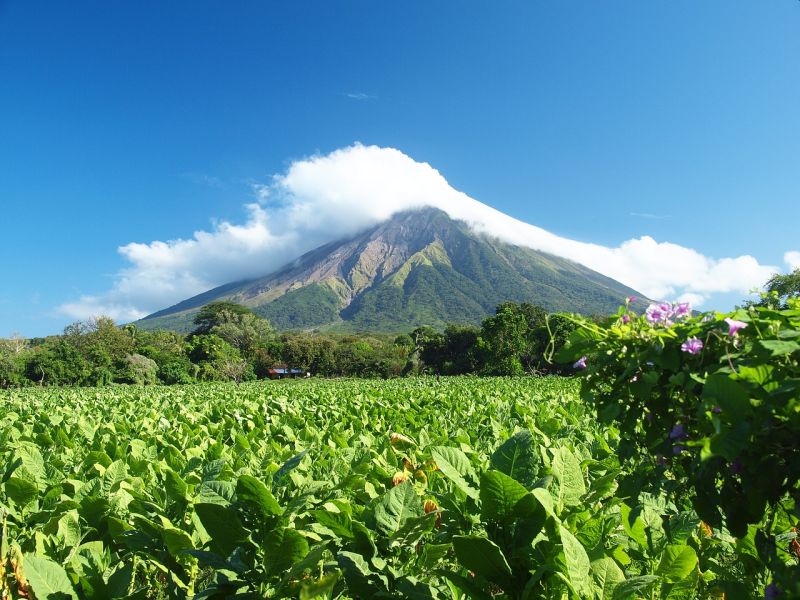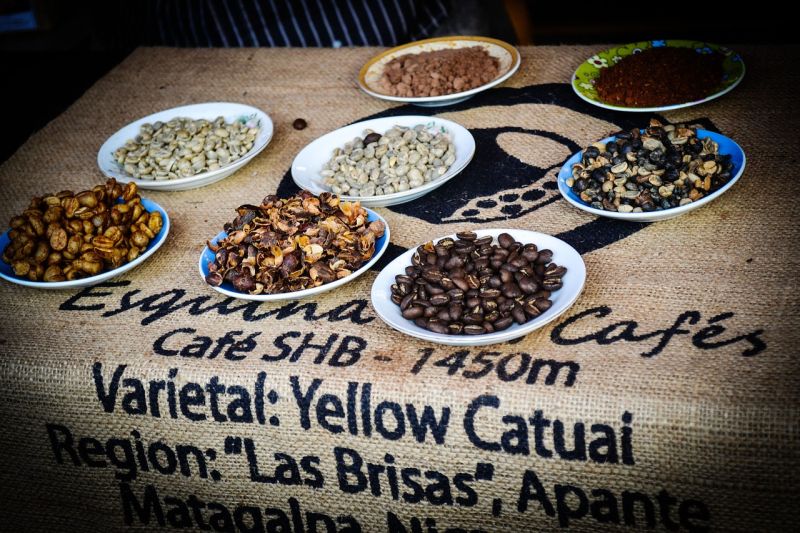Nicaragua is a major coffee producing nation. The Central American nation has been trying to get its coffee recognition increase for some time now. Nicaragua Coffee is usually balanced and has a wonderful flavor profile. The local environment results in low acid coffee that is complex in flavor and high in quality.
So let’s dive in deeper and see what’s to know about Nicaragua coffee and brands that sell this coffee.
State Of The Industry – Nicaragua Coffee And Where It’s Headed
Coffee from Nicaragua was once famous and well-recognized globally. Well, it still does pretty well, but not at the same level as what this brand once commanded. Years of political upheaval and civil war since the 1970s pushed back the nation and its coffee production.
Import bans from the USA and other political issues also affected the coffee business and caused more trouble.
The reputation of the coffee also suffered as the focus turned to quantity over quality. Increasing the quantity of production isn’t that bad an idea. However, if it comes at the cost of quality, it’s very liable to lose the label of gourmet coffee.
This, in turn, leads to consumers being unwilling to pay higher prices for the produce. And things like these upset the business and can cause trouble. Think of famous origin coffees, and it’s very likely that you won’t naturally think of Nicaragua coffee.
An average consumer would think of Sumatra Coffee, Colombian Coffee, Hawaiian Coffee, and several more before thinking of Nicaragua. Products from neighboring nations like Guatemala and Costa Rica coffee get far more recognition than Nicaragua.
And it’s one of the things that the government of the country and the best Nicaraguan coffee brands are trying to change.
Please keep in mind, this is a very rudimentary, extremely simplified version of the events. Political and business events of the country and international events, and the way it all affected the coffee growers is an extremely complex topic. It’s certainly not something that can be described in a few paragraphs.
Anyways, between policy making and business hurdles, there’s a lot to be done. And for now, they seem to be on the right path. The Nicaraguan government has made excellent moves in helping the growth of local coffee production. Of course, it helps that the local farmers are tenacious and hard-working people who are up to the challenge.
Coffee Growing Environment And Specifics
Specifics can vary, but much of Nicaragua coffee is high-grown. The local geography affords mountains and towering peaks that create an ideal habitat for coffee farms. A fair number of farms go a mile above sea level or even higher.
The high elevation allows beans and coffee cherries a longer time to ripen. The longer ripening time gives them enough time to be more flavorful and develop more complex flavors. Even so, Nicaragua Coffee is known to be mild and less acidic as compared to other coffees from the region.
It’s worth noting that much of Central American coffee favors milder, low acid flavors. Nicaragua gets a special mention because it manages to go milder than others.
Best Nicaraguan Coffee Brand Flavor Profiles
So what can you realistically expect coffee from this country to taste like? The actual profile can vary depending on growing region, farms, elevation, and several similar characteristics. However, a general flavor profile for Nicaragua coffee does exist.
Overall disposition of the coffee is milder than those grown in other Central American countries. However, the overall flavor profile is largely similar.
You can expect fruity and crisp taste notes with a medium to smooth body. Now that’s more on the line of some exquisite tasting brews! Aroma characteristics are generally defined as showing hints of chocolate, nuts, and caramel. The coffee shows off a medium to bright acidity.
Note that the acidity also represents a flavor profile, low acid coffee only represents the pH of the brew. However, coffee acidity is also used as a way to describe the taste notes and intensity of flavors.
Elephant Coffee Beans
Arabica coffee beans are the most commonly used variety in Nicaragua, as with most other places growing the beans for human consumption. However, one special variety of Arabica coffee beans deserves special mention here. The elephant beans!
These beans are a natural mutation of the Arabica plant. While they originally appeared in Brazil, they’ve taken very well to Nicaraguan coffee farms as well. Also known as Maragogipe, these beans make a strong impression thanks to their huge size. And yeah, that’s where the elephant beans name comes from.
Maragogipe is the more technically acceptable name, but it’s not nearly as fun as elephant beans! These beans offer delicate, but balanced flavors, bright acidity, and a clean finish. While the plant doesn’t have a huge yield, the large beans more than make up for it. Plus, the novelty and uniqueness of elephant beans is a huge draw.
Primary Coffee Growing Regions In Nicaragua

As a major coffee producer, Nicaragua has coffee farms all over the country. However, some regions shine more than the others in the coffees and the amount of coffee they produce. These regions are:
Nueva Segovia
Nueva Segovia is a region with a more unique touch to its coffee. It’s slightly different than other Nicaraguan coffees and has an exquisite flavor profile. The coffee is well-known for its floral and acidic profiles. It’s an interesting coffee, somewhat unique in taste and finish. This is a big reason that coffee from Nueva Segovia is hugely sought after.
Jinotega
Jinotega Region is the primary coffee growing region of Nicaragua. This region supplies most of the country’s coffee. The local climate and elevation are key factors that help coffee thrive here. Its volcanic soil and humid tropical climate provide what the coffee plant needs.
Additionally, the mountains of the Jinotega region offer a very hospitable area for coffee growing. The elevation here varies from 3200 to 5500 feet. It’s ample elevation and a great pick for brewing some amazing gourmet coffee.
Matagalpa
Located in the Northern region of the country, Matagalpa is similar to Jinotega as a haven for high-grown coffee. The high mountains in the area provide coffee trees with rich volcanic soil, while the tropical temperature encourages further growth. The elevation can go to nearly 4600 feet, which allows for flavorful coffee beans to grow.
Special Mentions
As we know, Nicaragua is amongst the largest coffee producers in the world. So there’s a lot more than the specific regions mentioned above. And even within these regions, there are some special cases that deserve to be mentioned.
Bosawas Biosphere Reserve is one interesting pick here. It encompasses the second-largest protected rainforest in the western hemisphere. The high elevation within the reserve allows for high-grown coffee to flourish and thrive.
And the protected status of the park means that the production is thoroughly monitored. This unique combination creates a more natural environment for coffee to grow.
Additionally, since no pesticides and chemicals are allowed inside the preserve, the coffee grown here is organic and high-quality. All these qualities make coffee grown here to be highly sought-after by the best Nicaraguan coffee brands.
Coffee Farming And Processing
Most of the coffee farms in Nicaragua are owned by small landowners. This means a huge chunk of the population is dependent on the coffee business. While this provides plenty of profitable employment, there also lurks the risk of exploitation of workers.
Of course, the government tries to fight these problems, but these pesky issues have a way of staying alive. Nevertheless, things continue to get better thanks to improved governance as well as a concerted push by customers for more ethical coffee. To be clear, this isn’t an issue just for Nicaragua, this is an issue with coffee farming everywhere.
Fair Trade Coffee
Customers often look for certifications like Fair Trade to check if the coffee is ethically sourced. This seal of such certifications provides a signal to the buyer that a respectable third party vouches for the ethics of the business.
Organic Coffee And Non GMO Coffee
The popularity of organic coffee has put Nicaragua in a uniquely beneficial position. While the country isn’t the biggest producer of organic coffee, a fair number of farmers have been able to get huge benefits from it. In some ways, you could say the tide of luck turned for these farmers.
In several cases, farms low in resource or with difficulty in maintenance couldn’t afford a bunch of synthetic chemicals. The problem was exaggerated by the political troubles of the country. As such, traditional coffee growing methods gained prominence for several farms. As a natural offshoot of this process, non-GMO coffee presented itself as a very viable option.
When the organic wave hit, these farms were uniquely positioned to take advantage!
How Nicaraguan Coffee Is Reaching Buyers
The unique characteristics of Nicaragua coffee have been attracting businesses for a long time. The way the country is currently positioned on coffee growing and similar issues has also proven to be a huge factor.
Several brands offer regular and gourmet Nicaraguan coffee. It’s also fairly popular as a single-origin coffee. These brands have managed to fully employ the unique characteristics of Nicaragua coffee and create interest amongst buyers.
An interesting choice amongst the best Nicaraguan coffee brands are products like Lifeboost Healthy Coffee. The brand provides excellent, high-quality coffee sourced solely from Nicaragua. By virtue of being grown in the Bosawas Biosphere Reserve, the coffee can be high-grown, organic coffee, non-GMO, and extremely well-flavored.
Additionally, putting extra care on coffee plantations has shown good results for the brand. Shade-grown coffee with low acidity sounds just the thing to enjoy.
How To Buy Nicaragua Coffee?
Many artisan roasters and specialty coffee shops carry this coffee. If you choose to buy single-origin coffee like this one, pay special attention to the roast date. Ideally, you’ll want a coffee that is freshly roasted. And by “fresh” I mean roasted a couple of days before you buy it.
Buying online is a reasonable option too. Most brands follow a small-batch roasting strategy, which allows them to quickly ship coffee right after roasting. Since roasting is usually done within the USA, you can expect the packages to arrive reasonably fast.
As an aside, if you intend to buy freshly roasted coffee, prefer roasters that have their business in the country. Even if there’s a roaster with magical skills in a different part of the world, things can’t work out unless they have magical instant shipping!
Popular websites like Amazon carry several options to buy. Similarly, individual roasters and coffee brands have their websites too, apart from being listed on Amazon. Coffee subscription boxes are a remarkable way of getting freshly roasted coffee delivered at a good frequency.
Should I Try Nicaragua Coffee?
Absolutely. As far as the taste profile goes, Nicaragua Coffee is a delight. The mild, low-acid coffee is a great pick for its flavor, aroma, and taste. The variety of coffee beans in the nation is excellent to satisfy even some of the more adventurous taste buds. Similarly, those with refined tastes in gourmet coffee will find coffee from this country to be dependable.

